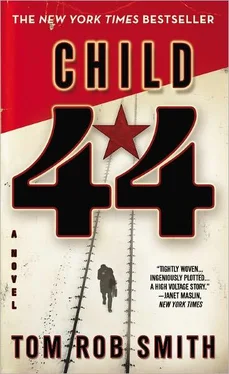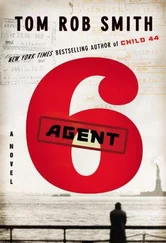Across the road children poured out of the school, breaking off in all directions. One young girl ran across the road, heading straight towards Leo and entering the apartment block where he was hiding. As she passed by in the gloom, her feet crunching on the shards of bulb glass, she paused, weighing up whether or not to speak. Leo turned to look at her. The girl had long black hair tied with a red band. She was perhaps seven years old. Her cheeks were pink with the cold. Quite suddenly she broke into a run, her little shoes tapping up the flight of stairs, away from this stranger and back home where she was still young enough to believe she was safe.
Leo moved to the glass door, watching as the last of the students filed out of the building. He knew Raisa wasn’t timetabled for any extracurricular activities — she’d be leaving soon. There she was, at the entrance, standing with a male colleague. He had a trim grey beard, round glasses. Leo noted that he was not an unattractive man. He looked educated, cultivated, refined, with busy eyes and a satchel brimming with books. This must be Ivan: Raisa had mentioned him, the language teacher. At a guess Leo reckoned this man was older than him by at least ten years.
Leo willed them to separate at the gates but instead they set off together, walking side by side in casual conversation. He waited, allowing them to get ahead. They were familiar with each other, Raisa laughed at a joke and Ivan seemed pleased. Did Leo make her laugh? Not really, not often. He certainly didn’t object to being laughed at when he was foolish or clumsy. He had a sense of humour in that regard but no, he didn’t tell jokes. Raisa did. She was playful, verbally, intellectually. Ever since they’d first met, ever since she’d tricked him into believing she was called Lena, he’d never been in any doubt that she was smarter than him. Considering the risks associated with intellectual agility, he’d never been jealous — until now, watching her with this man.
Leo’s feet were numb. He was glad to be on the move, trailing his wife at a distance of about fifty metres. In the weak orange glow of the street lights it wasn’t difficult to follow her — there were hardly any other people on the street. That changed when they turned on Avtozavodskaya, the main road, which was also the name of the metro station to which they were almost certainly heading. There were queues of people lined up outside grocery stores, clogging the pavements. Leo found it hard to keep track of his wife, made harder by her nondescript clothes. He had no choice but to shorten the distance between them, quickening his pace. He was less than twenty metres behind her. At this distance there was a danger she’d see him. Raisa and Ivan turned into Avtozavodskaya station, disappearing from view. Leo hurried forward, weaving in and out of the pedestrians. In the commuter crowds she might easily disappear. This was, as Pravda frequently boasted, the busiest and best metro system in the world.
Reaching the entrance to the station he descended the stone steps to the lower hall — an opulent chamber, an ambassador’s reception, with cream marble pillars, polished mahogany banisters illuminated by domes of frosted glass. Rush hour and not a centimetre of floor could be seen. Thousands of people wrapped up in long coats and scarves hustled in line at the ticket barriers. Going against the flow, Leo backtracked up the steps, using this slight elevation to survey the heads of the crowd. Raisa and Ivan had passed through the steel ticket barrier and were waiting for a place on the escalator. Leo rejoined the throng, sliding into gaps, edging forward. But stuck behind a mass of bodies he had no option but to resort to less polite methods, using his hands to steer people aside. No one dared do anything more than look annoyed, no one knew who Leo might be.
Reaching the ticket barrier, he was in time to see his wife move out of sight. He passed through, queuing and taking the first available position on the escalator. Stretching down the flight of mechanical wooden steps in a diagonal line to the bottom were the tops of a hundred winter hats. Unable to distinguish one from the other he leaned to the right. Raisa was maybe fifteen steps below him. In order to talk to Ivan, who was standing on the step behind and above her, she’d turned round and was facing upwards. Leo was in her line of view. He pulled back behind the man in front of him and, not wanting to risk another glance, waited until he was almost at the lower level before looking again. The passageway divided into two tunnels, for trains travelling north and south, each filled with passengers, shuffling forward, trying to make their way onto the platforms, vying for a position on the next train. Leo couldn’t see his wife anywhere.
If Raisa was en route home she’d be heading three stops north on the Zamoskvoretskaya line to Teatral’naya, where she’d change. With no choice other than to suppose this was what she was doing, he moved down the platform, looking right and left, studying the faces lined up, crammed together, staring out in the same direction, waiting for the train. He was halfway down the platform. Raisa wasn’t here. Could she have taken a train in the other direction? Why would she go south? Suddenly a man moved and Leo caught a glimpse of a satchel. There was Ivan. Raisa was by his side, both of them standing by the platform’s edge. Leo was so close he could almost reach out and touch her cheek. If she turned her head even a fraction they’d be eye to eye. He was almost certainly in her peripheral vision; if she hadn’t seen him it was only because she wasn’t expecting to see him. There was nothing he could do, nowhere to hide. He continued down the platform, waiting for her to call his name. He wouldn’t be able to explain this as a coincidence. She’d see through his lie, she’d know he was following her. He counted twenty steps then came to a stop by the edge of the platform, staring at the mosaic in front of him. Three separate lines of sweat ran down the side of his face. He didn’t dare wipe them away or turn to check in case she was looking in his direction. He tried to concentrate on the mosaic, a celebration of Soviet military strength — a tank with its barrel pointing straight out, flanked by heavy artillery and mounted by Russian soldiers in long sweeping coats brandishing guns. Very slowly he turned his head. Raisa was talking to Ivan. She hadn’t seen him. A gust of warm air blew down the crowded platform. The train was approaching.
As everyone turned to watch, Leo caught sight of a man looking in the opposite direction, away from the oncoming train, looking directly at him. It was the briefest of glances, eye contact for a fraction of a second. The man was maybe thirty years old. Leo had never seen him before. Yet he knew immediately this man was a fellow Chekist, a State Security operative. There was a second agent on the platform.
The crowd surged forward towards the train doors. The agent was gone, out of sight. The doors opened. Leo hadn’t moved; his body was turned away from the train, still staring at the exact point where he’d seen those cool, professional eyes. Brushed aside by passengers disembarking he recovered from his surprise and boarded the train, one carriage down from Raisa. Who was that agent? Why did they need a second agent following his wife? Didn’t they trust him? Of course they didn’t. But he hadn’t expected them to take such extreme supplementary measures. He pushed his way down towards the window through which he’d be able to see into the adjoining carriage. He could see Raisa’s hand, holding the side bar. But there was no sign of this second agent. The doors were about to shut.
The second agent boarded the same carriage as Leo, slipping past him with apparent indifference and taking up position several metres away. He was well trained, calm, and had it not been for that brief glance Leo might not have spotted him. This agent wasn’t following Raisa. He was following Leo.
Читать дальше












